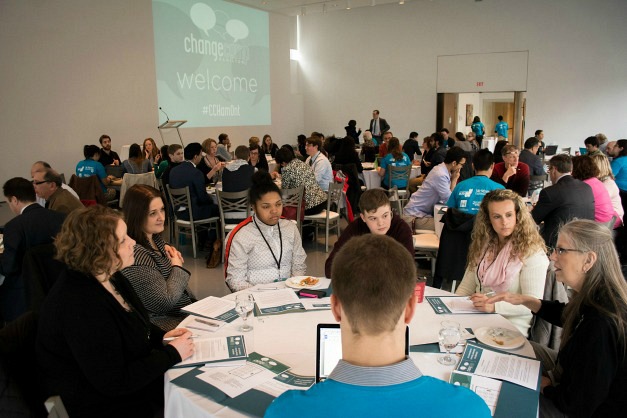Community engagement needs to be “more than just a conversation”

About 100 Hamilton community members, municipal leaders and McMaster faculty and staff exchange ideas on a range of topics at Change Camp Hamilton held recently at the Art Gallery of Hamilton.
Community engagement needs to be “more than just a conversation.” That was the message that came out of Change Camp Hamilton, a public dialogue held recently that looked at ways to take action on some of the key challenges facing Hamilton.
About 100 community members, municipal leaders, and McMaster students and faculty, attended the event to share ideas, build partnerships and discuss ways to meaningfully engage with Hamilton communities.
Organized by the McMaster Students Union (MSU) in partnership with McMaster’s Network for Community Campus Partnerships, Mohawk College, the City of Hamilton and Volunteer Hamilton, the event was made up of a series of roundtable discussions, which focused on topics proposed in advance by dialogue participants.
“This is meant to be more than just a conversation- we’re really concerned about the output afterwards,” says Jacob Brodka, MSU Vice-President, Administration and key organizer of the event. “There is a lot of value in the diversity of the group gathered here tonight. We hope this will lead to more meaningful, better informed discussions and allow us to walk away with a set of action items.”
Discussions centred around a range of issues including transit, youth unemployment, the arts community in Hamilton, green spaces and engagement in municipal politics. These conversations occurred simultaneously on social media, generating over 1300 tweets and trending number two on twitter in Hamilton throughout the evening.
Sheila Sammon McMaster’s Director of Community Engagement, and Chair of the Network for Community Campus Partnerships, says events like these provide a valuable opportunity for McMaster to learn from the community.
“We need to ask ourselves, ‘what does the community want?’ Because that’s the heart of what community engagement needs to be at McMaster,” says Sammon. “We want to hear from the community and all our partners about how can we work collaboratively, so together, we can turn conversations into action and take concrete steps to make Hamilton communities even better,”
Suzanne Brown, Manager of the Neighbourhood Action Strategy at the City of Hamilton and co-organizer of the event, says hearing from the community and partnering with key Hamilton institutions like McMaster, is critical to effective city-building.
“Building partnerships is the only way you can create good policy a positive direction for a city,” says Brown. “No one agency, or municipality drives what the city is. We all collaboratively drive this city and we all have a responsibility to participate in the planning of where this city is going. Events like this are a good first step.”
Jim Vanderveken, Dean of the Faculty of Interdisciplinary Studies at Mohawk College was also on the organizing committee says event like this help institutions like his better understand how to meet the needs of the community.
“When you see students involved in this discussion, when you see community leaders that have a stake and a voice around this process, when you have such divergent perspectives that are brought together, we really begin to understand the vision and the potential for this community,” says Vanderveken. “That’s the value of a gathering like this.”
The results of the discussion will be summarized and shared with participants to identify opportunities, ideas and potential new partnerships that could be put into action going forward.
